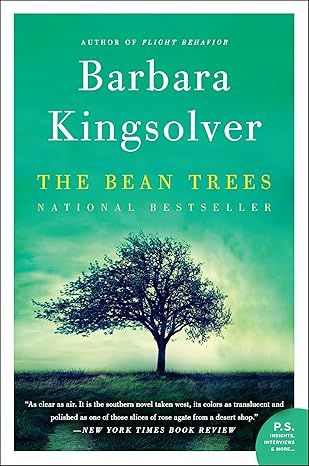The Bean Trees Anniversary Edition: A Novel
4.4 out of 5
11,504 global ratings
"The Bean Trees is the work of a visionary. . . . It leaves you open-mouthed and smiling." — Los Angeles Times
A bestseller that has come to be regarded as an American classic, The Bean Trees is the novel that launched Barbara Kingsolver's remarkable literary career.
It is the charming, engrossing tale of rural Kentucky native Taylor Greer, who only wants to get away from her roots and avoid getting pregnant. She succeeds, but inherits a three-year-old Native American girl named Turtle along the way, and together, from Oklahoma to Arizona, half-Cherokee Taylor and her charge search for a new life in the West. Hers is a story about love and friendship, abandonment and belonging, and the discovery of surprising resources in seemingly empty places.
This edition includes a P.S. section with additional insights from the author, background material, suggestions for further reading, and more.
272 pages,
Kindle
Audiobook
Hardcover
Paperback
Audio CD
First published January 19, 1998
ISBN 9780060175795
About the authors
Barbara Kingsolver
Barbara Kingsolver was born in 1955 and grew up in rural Kentucky. She earned degrees in biology from DePauw University and the University of Arizona, and has worked as a freelance writer and author since 1985. At various times she has lived in England, France, and the Canary Islands, and has worked in Europe, Africa, Asia, Mexico, and South America. She spent two decades in Tucson, Arizona, before moving to southwestern Virginia where she currently resides.
Her books, in order of publication, are: The Bean Trees (1988), Homeland (1989), Holding the Line: Women in the Great Arizona Mine Strike (1989), Animal Dreams (1990), Another America (1992), Pigs in Heaven (1993), High Tide in Tucson (1995), The Poisonwood Bible (1998), Prodigal Summer (2000), Small Wonder (2002), Last Stand: America's Virgin Lands, with photographer Annie Griffiths (2002), Animal, Vegetable, Miracle: A Year of Food Life (2007), The Lacuna (2009), Flight Behavior (2012), Unsheltered (2018), How To Fly (In 10,000 Easy Lessons) (2020), Demon Copperhead (2022), and coauthored with Lily Kingsolver, Coyote's Wild Home (2023). She served as editor for Best American Short Stories 2001.
Read more
Reviews
L.D
5
What A Pleasant Surprise!
Reviewed in the United States on May 14, 2014
Verified Purchase
The title of this book caught my attention. I am so glad it did! What a pleasure it was getting to know Taylor! I loved the way the story was told consistently from her viewpoint. . . her 'voice' was heard through-out, even when I thought she 'had it wrong' it was always clear that this was Taylors story, and she would reach her own conclusions, in her own time and in her own way.
The variety of characters was both believable and interesting. I thoroughly enjoyed the use of description in creating and recreating memories and events, It put me right there in the car with Taylor as she traveled cross country. I saw what she saw, and was able to laugh, and cry right along with her.
Lou Ann is an important part of this story. Emotionally she and Taylor are very different, yet together they are the epitome of every female psyche. In truth, they both teach lessons, and what is life, except a process of growth? I applaud the author for keeping me guessing until the very end. . .there was more than one possibility of course and I love a book that isn't predictable. This book is not a 'Love story', but it does examine what the word truly means. It is not a political satire, but it does make one question whether man's governments will ever accomplish the most basic of human needs. It is not a religious book, but it does 'poke fun' at hypocrisy. It does not get bogged down with moralization, but it does tell the stories of people who's lives are molded, by their economic situation in life. It also offers hope that the 'good' can and often does win out over 'evil'.
I am so glad to discover this author, and hope to savor the rest of her books!
Read more
3 people found this helpful
Bettye R. Clement
5
a beautiful story
Reviewed in the United States on June 30, 2024
Verified Purchase
This is Barbara Kingsolver at her best. She pulls at your emotions and challenges your assumptions and makes you want to keep on reading because you know there’s still a lot of real life to come.d
Ratmammy
5
A little girl named Turtle....
Reviewed in the United States on January 27, 2002
Verified Purchase
THE BEAN TREES is a novel about a young woman, Taylor Greer, who leaves her home state of Kentucky to find a life outside of what she knew - growing up to become barefoot and pregnant. She wanted more than that, but she did not really know what she wanted. She finally arrives in Tucson and meets a woman who wants to give Taylor a 3 year old child. Taylor promises to take care of the little girl. Whether the woman is the child's mother, we never do find out. But Taylor does find out right away that something is not right with the child. Turtle, the name Taylor gives the child, does not talk. Taylor also finds bruises over the child's body while giving her a bath. Maybe Taylor has saved this child from a horrible life, but now she is responsible for the welfare of this little Indian american girl. But now what to do? No money and no job, and she's got a kid she never planned on having. Taylor and Turtle end up in a small town in Arizona and after meeting several nice people who help them out, they end up living with a gal named Lou Ann, who has her own story to tell. The book is intertwined with the stories of both women so we get to know them both very well. Along the way they meet and get involved with a hispanic couple, Estevan and Esperanza. They are from central America, and their story is a mystery, except we know Esperanza knows very little English, and Estevan was an English teacher in his home land. The four of them, along with little Turtle, become good friends, and soon Turtle is responding to the love she is getting from her new family. But there is still the mystery of what really happened to little Turtle.... THE BEAN TREES is the 2nd Barbara Kingsolver novel I have read, THE POISONWOOD BIBLE being the other one. This second novel reads quite differently than POISONWOOD BIBLE did, and I guess one reason is that THE BEAN TREES was written over a decade before. Ms. Kingsolver's skills as a story teller greatly improved between these two novels, but that does not mean THE BEAN TREES is a poorly written book. On the contrary, I found it very well written and enjoyable to read. The feel of both books is very different. While POISONWOOD had the feel of an epic, THE BEAN TREES was a much more simpler novel (being a much shorter novel helped!) I can't say whether one book was better than the other. I liked both equally. What I'm finding I really like about Ms Kingsolver's books is that she is very good at character developement. She knows how to paint a character well enough that I was able to picture right away what these characters were all about. They were not shallow one dimensional people, but people I could care about. Obviously, I am giving THE BEAN TREES a glowing recommendation. It was probably one of the better books I read in 2001.
Read more
130 people found this helpful

Wendeborg
5
The Bean Trees by Barbara Kingsolver
Reviewed in the United States on April 17, 2014
Verified Purchase
This cleverly written, engrossing tale of Marietta/Taylor Greer's escape from her birthplace in Kentucky, and what eventually happens to her in Arizona. The story (and it's a good story) is about family, friendship and our responsibilities as people. To give an example of Kingsolver's style (of which I have long been a fan) her description of Taylor's first stop, a bar in Oklahoma: "..and the black grease on the back of the stove looked like it had been there since the Dawn of Man. The air in there was so hot and stale it felt like I had to breathe it twice to get any oxygen out of it." - p. 21
At this point Taylor is 'given' an Indian baby girl - whom she callsTurtle.
And this, a description of the house she ends up sharing with Lou Ann and her baby Dwayne Rae: "The house was old and roomy, there was plenty of space for Turtle's bed in my room. It was the type of house they called a "rambling bungalow" (the term reminded me somehow of Elvis Presley movies) with wainscoting and steam radiators and about fifty coats of paint on the door frames..." - p. 191
SPOILER ALERT!
Taylor has a job, and gets to know two Guatemalan refugees who are being helped by Mattie, Taylor's boss. Now Taylor is starting to understand the sort of problems other people face, and so when she decides to try to sort out her own legal standing with Turtle, she volunteers to take Estevan and Esperanza with her.
This scene where the Guatemalans are posing as Turtle's natural parents, giving Taylor permission to adopt her, was heart-wrenching: "Esperanza...held her against her chest, rocking back and forth for a very long time with her eyes squeezed shut...the rest of us watched... Here was a mother and her daughter, nothing less. A mother and child - in a world that could barely be bothered with mothers and children - who were going to be taken apart. Everybody believed it." - p. 291
How appropriate for this time!
Read more
33 people found this helpful
Melissa Gabriel
5
Missing page
Reviewed in the United States on April 24, 2024
Verified Purchase
I love all her books but missing pages? Come on Amazon! I would like a new corrected Kindle copy of this book. Melissa Gabriel, author of Shooting from the Heart.
2 people found this helpful

Alice Dennis Kennedy, author of THE SCAR and EXTRAORDINARY CIRCUMSTANCESl
4
A book that makes the Kentucky dialect read like poetry while telling more than one story that deals with humane actions
Reviewed in the United States on March 11, 2014
Verified Purchase
This book is excellent, but I chose 4 stars instead of 5 because I thought that Lou Anne's introductory story jumps in out of the blue. I knew that it had to be an important part of Taylor Marietta's story, but a subtle link, before it took over, would have been appreciated. Also, there are several misspelled words toward the end of the book. That always stops a reader momentarily. All of that aside, THE BEAN TREE is a moving and sometimes funny story of a poor but brave girl who has been raised by a single mother who knows how to build character. Taylor is cutting the apron strings "to become an independent somebody" as she drives from a small farm town in Kentucky. She is naive but built of the right stuff. When an abused baby is given to her in her broken-down bug of a car while she's in Oklahoma, she instinctively feels responsibility. Although she knows nothing about babies, she makes decisions for the sake of the Indian baby. She names her Turtle. Care for the baby leads to friendship and a job with Mattie, who hides illegal Mexicans. Her desire for a home for Turtle causes her to move in with a deserted new mother, Lou Anne. The sadnesses of others moves her to speak and act humanely. Because she has Indian blood, she thinks the Cherokee Nation in Oklahoma will be "what she can fall back on," the source of her being "somebody," so she makes a brave trip back to take a Mexican couple to a safe place and to search for Turtle's relatives, hoping for their consent to her adoption of Turtle. The twist is that the Mexican couple pull off the scheme that makes the adoption possible. Through all of her escapades, she pays her good luck forward. As a result, she grows stronger and ends up a happy mother. Many issues, hers and those of others, are covered in her story--- determination, depression, and selflessness. Using first-person makes her Kentucky dialect a prize. Alice Dennis Kennedy, author of EXTRAORDINARY CIRCUMSTANCES.
Read more
11 people found this helpful
Danielle N. Swanson
4
Great Book for Students
Reviewed in the United States on October 16, 2020
Verified Purchase
As a college instructor, I picked this book up over the summer as a less intense novel than what I typically have my class read. My students absolutely loved it. Although the book is more than three decades old, the themes and topics are still relatable. While reading it, I literally had to double check the publication date because the topics seemed so relevant, particularly the focus on immigration issues. Kingsolver is an incredible storyteller. The characters are unique and come alive. My students became invested in the relationships and therefore were engaged in the classroom conversations and activities. My biggest criticism of the book, however, is how the ending came off as unrealistic. Both the resolution to the immigration and foster issues seemed unplayable and brought up questions that caused me and my students to do additional research into these elements. Some of these issues are addressed in the book’s sequel, but it is still an issue with the book independently. That being said, I am teaching the book again this semester and have already gotten a positive reaction from students. I would recommend the book but acknowledge the flaws.
Read more
21 people found this helpful
Amazon Customer
4
Availability
Reviewed in the United States on March 17, 2024
Verified Purchase
Well used but reasonable shape. As advertised
Lostdog1
4
great book
Reviewed in the United States on April 28, 2023
Verified Purchase
I’ve just started following Kingsolver and have yet to be disappointed. Readable, humorous at times but always a heart felt message. Not a difficult book, but definitely a step up as far as it’s literary value. I’ll be reading a lot of this author in the future.
16 people found this helpful
John P. Jones III
3
A morality play...
Reviewed in the United States on October 16, 2009
Verified Purchase
Barbara Kingsolver wrote this novel over 20 years ago, and it has now become a school assignment, which seems to invariably precipitate numerous mindless 1-star reviews from those "forced" to read it. The novel has a certain charm, featuring individuals struggling against either the "system," or their own "fate," against long odds, and winning, producing a warm feeling as the last page is turned. It features a young woman from the Appalachian area of Kentucky, determined to escape her "fate" of becoming pregnant in high school. She escapes entirely, push-starting an old VW across the country, and in the process, acquires a new name, Taylor, as well as an Indian child, who is offered to her in Oklahoma, by a relative eager that the child not experience further abuse. Taylor ends her journey at the "Jesus is Lord Used Tire" shop in Tucson, AZ, and proceeds to acquire like-minded friends, usually in distressed economic circumstances. I found it intrinsically interesting how Kingsolver moved the novel forward, as well as her style, which contained some original descriptive passages, such as her description of the Indian child, nicknamed, Turtle: "her body, her face, and her eyes were all round. She was someone you could have drawn a picture of by tracing around dimes and quarter and jar tops." Or comparing her philosophy about men to the instructions for replacing the flapper ball (hum!) in a toilet: "Parts are included for all installations, but no installation requires all of the parts."
The novel addresses two central political and/or social issues, child abuse and, depending on your political outlook, "undocumented migrants" or "illegal immigration." At one time, neither issue was discussed; now they seem to be in the news literally every day. Twenty years ago Kingsolver may have been at some sort of mid-point. As a "morality play" though, the novel simply did not work for me. The characters are cardboard, two-dimensional types. The women are heroic types, fighting assorted threats from males, or their indifference. The only appealing male character is Estevan, an native Indian from Guatemala, who speaks better English than all the American females in the book, and who, along with his wife, has fled almost certain execution in his own country, and entered the United States illegally, supporting himself by washing dishes at a Chinese restaurant.
The Indian child, "Turtle" is only 3 years old, and has been molested and abused, so severely that bones have been broken. There is another attempt on her in a park in Tucson. Sexually abuse of infants does occur, but it is extremely rare. Kingsolver includes the astonishing claim "...that maybe one out of every four little girls is sexually abused by a family member. Maybe more." (p 182) No mention of the abuse of little boys, but a reasonable person might conclude this seemingly upbeat novel by praying for a nuclear war that would wipe out the entire human species if they believed this claim. The number of "pervs" among us, as a percentage of the human population, probably has not changed over the last 50 years. There is an immense downside to constantly hyping a real, but slender threat: teaching all children to constantly be freighten of strangers, not to mention the "wet blanket" effect this has on any normal male. Why should he be involved as any sort of role model for youth, be it an athletic coach, or a Boy Scout leader, when the only "real" reason must be a perverted one?
Likewise with the issue of immigration, particularly from Latin America. Might not Estevan, and his wife have had a safe, secure, and enjoyable life if the CIA had not overthrown the democratically elected leader of Guatemala, Jacobo Guzman, in 1954? How many Americans, and not just Wall Street types, openly enjoy a system of having 12-20 million poor people within our borders, without legal rights, who clean our homes, care for our children, wash the dishes in our restaurants, or construct our homes? None of this is mentioned. The people from "south of the border" come here not so much to escape death from goon squads as to improve their lives economically, often at the expense of workers from Taylor's home town in eastern Kentucky.
Each issue is quite real, but they deserve much better treatment than in this particular "morality play." I may be stretching it a bit to grant 3-stars, but I understand from very reliable reviews that "The Poisonwood Bible" is that much more complex and nuanced novel, and so I'll applaud the evolution in presentation.
Read more
20 people found this helpful
Top Barbara Kingsolver titles
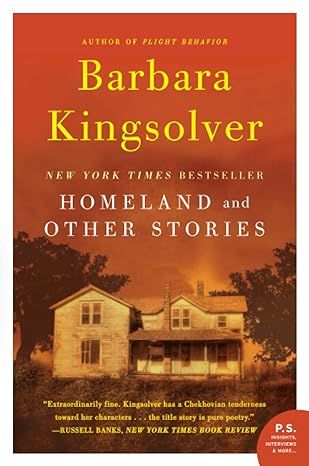
Homeland: And Other Stories
4.2
-
691
$5.24
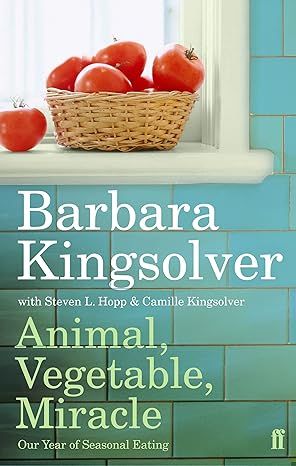
Animal, Vegetable, Miracle: Our Year of Seasonal Eating
4.5
-
2,496
$7.96

Animal Dreams: A Novel
4.4
-
2,888
$10.49
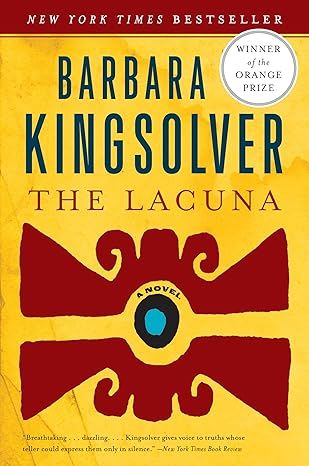
The Lacuna: A Novel (P.S.)
4.4
-
4,450
$1.77
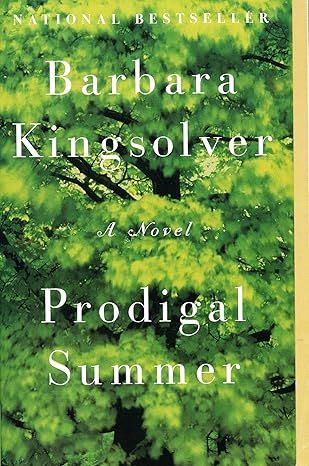
Prodigal Summer: A Novel
4.4
-
6,309
$8.99
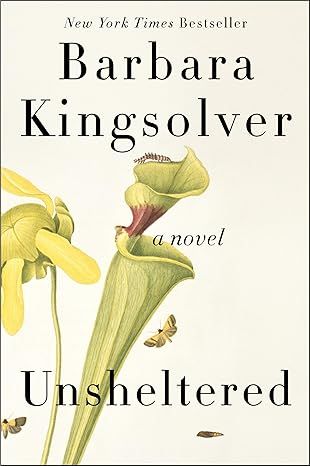
Unsheltered: A Novel
4.2
-
12,750
$5.24
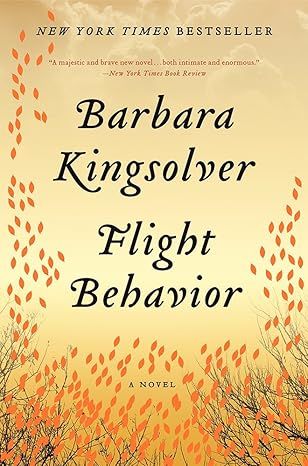
Flight Behavior: A Novel
4.3
-
9,479
$1.84
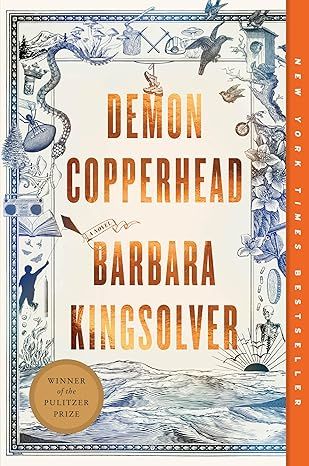
Demon Copperhead: A Novel
4.6
-
110,129
$16.99
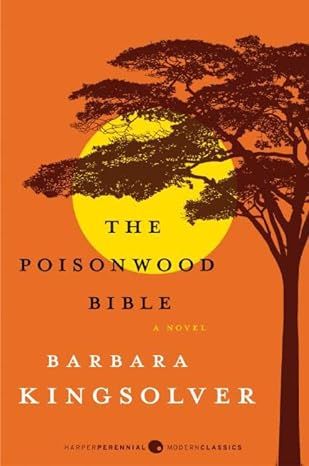
The Poisonwood Bible: A Novel
4.5
-
16,256
$12.69
Best Sellers

The Tuscan Child
4.2
-
100,022
$8.39

The Thursday Murder Club: A Novel (A Thursday Murder Club Mystery)
4.3
-
155,575
$6.33

Sapiens: A Brief History of Humankind
4.6
-
140,302
$13.49

The Butterfly Garden (The Collector, 1)
4.3
-
88,556
$9.59

Things We Hide from the Light (Knockemout Series, 2)
4.4
-
94,890
$11.66

The Last Thing He Told Me: A Novel
4.3
-
154,085
$2.99

The Perfect Marriage: A Completely Gripping Psychological Suspense
4.3
-
143,196
$9.47

The Coworker
4.1
-
80,003
$13.48

First Lie Wins: A Novel (Random House Large Print)
4.3
-
54,062
$14.99

Mile High (Windy City Series Book 1)
4.4
-
59,745
$16.19

Layla
4.2
-
107,613
$8.99

The Locked Door
4.4
-
94,673
$8.53
